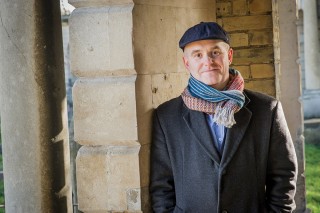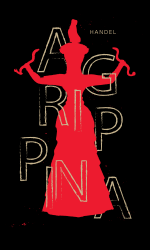Title

Laurence Cummings
(Photo by Robert Workman)In one of Agrippina's pivotal scenes, the Emperor Claudius—at first presumed dead at sea by the scheming title character, only to be inconveniently rescued—crows in triumph over “conquered Britain” as a “new subject” for the Roman throne. That wouldn't exactly be music to Brexit supporters—but, then, international migrants like George Frideric Handel (né Georg Friedrich Händel) would have had a harder time in a Europe of zealously policed borders.
Body
Indeed, Agrippina is the towering result of Handel's first travels abroad, which he undertook in his early 20s. Between 1706 and 1710, the cosmopolitan composer, who was born in Germany, deepened his artistic and practical experience by working for patrons in various Italian cities. He concluded that chapter of his career with the premiere of Agrippina—the third of his operas that have survived—at the most prestigious opera house in Venice, and it became a sensation. Yet it's seldom performed now, which makes it all the more exciting that Juilliard415 and Juilliard singers will present Agrippina in February—there will be three staged performances at the Willson Theater (February 18, 20, 22; extremely limited seating) and one concert performance at Alice Tully Hall (February 11). The Juilliard productions are part of Carnegie Hall's February 3–21 citywide celebration of Venice's artistic legacy, La Serenissima: Music and Arts From the Venetian Republic.
“Agrippina is a comedy with a heart and with a purpose,” British conductor and harpsichordist Laurence Cummings, who will conduct the concert performance, told The Journal. “Handel is poking fun at those in power. Agrippina shows how bad ambition can be when it gets out of control.” Throughout the opera we see Agrippina, wife of Claudius, shrewdly manipulate whoever stands in the way of her gaining the imperial throne for Nero, her son from a previous marriage. “Some of her music is almost irrationally beautiful. The Devil does get the best tunes, as they say,” added Cummings, a leading figure in the early music scene who is the director of both the London and the Göttingen Handel festivals. “But Handel is also sympathetic to these characters. It's a work that stands alone in terms of the combination of irony and humor and serious emotion.”
One of the great things about Agrippina, Cummings noted, “is that you get a flavor of the Venetian audience and can sense the world of commedia dell'arte. It's not slapstick but a mercurial wit and psychological humor.” The libretto, considered by some the finest opera text Handel ever set, was written by Vincenzo Grimano, a man of the theater who also enjoyed the thrill of political maneuvering. (He played for high stakes as an international diplomat/agent for the Habsburg Emperor and was made a cardinal along the way.) Grimano belonged to a prominent and illustrious theater family that was instrumental in the growth of public opera in Venice in the 17th century. Together with his older brother he co-owned the Venetian theater where Agrippina was first produced and where, more than half a century earlier, Monteverdi's L'incoronazione di Poppea had premiered.
Cummings believes Agrippina is among Handel's finest works. “What I notice in this score is sheer zest and youthful energy,” he said. “After Handel settled in London he attained a certain level of comfort and authority, which comes out in a rich tapestry of works later on. In Agrippina you have a composer who is still only as good as his last performance, slightly more hand to mouth. And for that reason, it's very fresh and high in energy.”
The characters in Agrippina come from famous accounts by ancient Roman historians. “Tacitus and Suetonius were sort of the pornography of the 18th century,” said Louisa Proske, who will direct Juilliard's fully staged production. “Almost everybody in the opera is driven by lust: the barometer of sexual craving is very high in the palace. But the only way Agrippina's sexuality manifests itself is through the will to power, which makes her more rational than the other characters. She operates as the mastermind manipulator.”
Jeffrey Grossman (MM '11, historical performance), who will take over musical direction for the staged performances, said what he finds special about Agrippina is “the way Handel mixes the comic elements (which basically occur in the recitatives) with very serious subject matter. He manages to make it feel like 100 percent opera seria and 100 percent mock serious.”
In addition to conducting the ensemble, Grossman and Cummings will each play harpsichord as part of the continuo in their respective performances, a challenge Cummings compared to jazz improvisation. “We always agree on the chord structure of a certain passage and improvise around it. The best continuo playing is when you are in the moment and develop from that,” he said.
The Tully concert performance will mark Cummings's first Juilliard collaboration. “I'm very excited to be working with Juilliard415, since I've seen them in concert and know a lot of their professors,” he said. “They're all very accomplished musicians who know their instruments and their sources well.” But for all the knowledge and experience the historically informed performance movement has accrued, he points out, “these are just the building blocks. When all is said and done, anyone will tell you that the job of a musician is to move the soul of the listener. All the rhetorical devices in the music are meant to do that: we need to cultivate the affect and emotion behind the music.”
Handel himself, Cummings said, was above all a man of the theater. “He relished the idea of putting on musical performances for people and wanted to stimulate his audience and make them feel engaged. The challenge and the joy for us as performers is to make that happen.”







